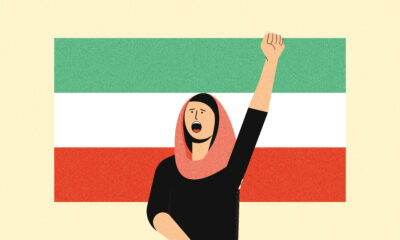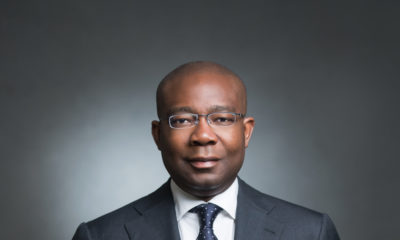Features
Lara Popoola: Question For Every Nigerian… “How Corrupt Am I?”
 Corruption is universal, and Nigeria is a country universally acclaimed for corruption. In spite of all the rules and laws prohibiting corrupt practices, it continues to thrive under weak legal, political and administrative institutions; thereby exerting its penetrating influence on ordinary Nigerians who are trapped in a moral maze as they attempt to conduct their businesses. These Nigerians live their lives with all honesty and integrity, but are too often compelled to conform or be crushed.
Corruption is universal, and Nigeria is a country universally acclaimed for corruption. In spite of all the rules and laws prohibiting corrupt practices, it continues to thrive under weak legal, political and administrative institutions; thereby exerting its penetrating influence on ordinary Nigerians who are trapped in a moral maze as they attempt to conduct their businesses. These Nigerians live their lives with all honesty and integrity, but are too often compelled to conform or be crushed.
In light of the deteriorating state of common affairs, it is only appropriate that I should note the deep chasm of distrust and rising cynicism of many Nigerians, about the credibility of the President’s recent anti-corruption battle against some senior government officials and their associates accused of misappropriating public funds. A corruption battle which has been highly speculative and seriously debilitated, by a legal justice system that is lethargic, fundamentally flawed and unfit for purpose.
While I strongly affirm the absolute necessity to prosecute and penalise these “giants” of corruption, I am also mindful of the fact that the government is just one of two hands that claps to the beat of corruption. Hence, we must also address the contribution and mindset of individuals to the existence of corruption in Nigeria, if we are going to wage a successful war against it. The customary condemnation of government and public officials for corruption often authorises many Nigerians to assume the position of spectators and commentators, thereby mitigating their individual participation. They remain oblivious of the fact that corruption does not discriminate.
Rather, it acquaints itself with people of all social pedigrees, ages, tribes, gender and political parties. It has no regard for level of education or even religious affiliations; for we know many have audaciously testified about the supposed ‘blessings’ of their ill-gotten gains. It is no wonder, that as Nigeria continues to pay its legislators high salaries and stupendous allowances while majority of the population lives in abject poverty and darkness. There is an increased pressure on people to become wealthy in order to alleviate their poverty.
Consequently, the courage to adhere to high standards of propriety erodes away and morality declines as individuals ask “why should I be the sole custodian of honesty and integrity?” After all, an employee who is not earning a living wage and is owed accrued salaries, without the assurance that he will have a job tomorrow, might choose to supplement his income with bribes and other corrupt means.
It is worth noting, that it is not just the man who receives the bribe that is corrupt, but also the man who offers it. Corruptive norms are so widespread, it is sometimes inconceivable for many to comprehend how employing families and friends of the boss rather than the best candidates for jobs perpetuates corruption. Or “rubbing hands” with custom officials to allow the importation and exportation of banned items; or parents using unorthodox means to ensure the admission of their children to higher institutions; or assuming it is acceptable to be dishonest in business dealings just because “that is how it is done here”.
It is because of this prevailing warped mentality, that individuals must not undermine their susceptibility to corruption, for at various stages of life, one might be compelled to confess “I was corrupt”, “I am corrupt” or “I will be corrupt”. This is simply because corruption corrupts.
It is relentless and progressive in its efforts. There was once a time when corruption and development co-existed on a tolerable scale, and Nigeria was able to reap immediate benefits from its natural resources. Unfortunately, this is no longer the case. The adverse impact of corruption on public and private life is obvious and the country is confronted with a vicious cycle of lower investment and growth, higher poverty and inequality, greater fiscal imbalance, and weaker delivery of basic public services. How else does one rationalise the 5th largest provider of crude oil in the world experiencing chronic fuel shortages?
In echo of the President, to conclude that if Nigeria does not kill corruption, corruption will kill Nigeria, is as certain as the theorems of Pythagoras. It will continue to claim thousands of lives on poorly constructed roads, many more will lose their lives in hospitals because of inadequate healthcare facilities. The dreams of many young people will die because money meant for better educational system has been diverted into private pockets and many senior citizens will continue to suffer as they struggle to receive their pensions. Finally, hope will perish when poverty gains a stronghold and misery is intensified.
This is not an attempt to indict every Nigerian of corruption – that would be an unwarranted blanket criminalisation. Rather, my aim is to intrude the thoughts of individuals who unconsciously or through blissful ignorance live their lives without considering their responsibility for corruption and its powerful influence on their day to day living, with the hope to reform our approach to citizenship by asking “how corrupt am I?” and then proceed to actively challenge questionable norms that are detrimental to our development as a nation.




















